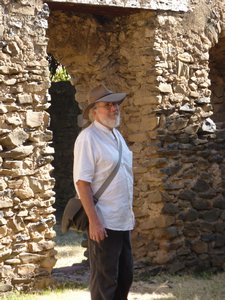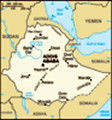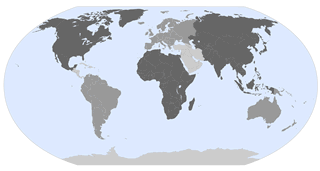Advertisement
Published: January 10th 2010

 Standing Outside
Standing Outside
another church. They have a lot of them here and we have seen more than I need.Still no photos I am afraid. These internet cafes have slow connections and many also have a block on the programs needed to upload photos. It is going to be a big day when I finally find one that allows photo upload.
This post starts out with some impressions of Ethiopia generally - litter, poverty, beggars, aid - and then goes on to cover what we have been doing and generally where we have been. I should also note that we are not sure that our emails are always getting out of the country. The posts seem to be going up but for some reason emails that we have sent may not be getting through. If you need to contact us a message on the blog might be the most certain way while we are in this country. That said, we are now on our way south into the Bale Mountains and then the Omo Valley. After that we go in a convoy we think into Kenya. Not too sure when we will post again.
It could be an indicator of the success of environmental policies in Ethiopia, or much more likely to be a sign of the relativel

 Nice Country
Nice Country
Becoming more fertile here and life looks like it might be a little easierlevel of poverty in the country, but there is a marked lack of litter about in this country compared to the last couple we have travelled through. Very few plastic bags blow around - you pay for them in the markets - and there are no half-way usable plastic bottles anywhere. Used bottles are very popular with the inevitable kids and others who flock to the truck at every stop along the road. Paper is valuable and every possible scrap is put to use of some sort. Kids look for pens and books all of the time. Some of it is just standard begging - they know from experience what Westerners are likely to give away - but some of it at least seems to be desperate need.
The place is poor. We are informed that the average income is about $1US a day, or 13 Birr in the local money. A good wage is considered to be $7US a day. Our truck kitty allocates $3US per day for food while we are camping out. We eat very well and we obviously don't shop as well as locals but, on the average income, you would need to eat very

 Threshing
Threshing
Stock are used to walk around on the wheat and barley to thresh it. cheaply and you still wouldn't have a lot left over for a roof, clothing or other essentials.
There are a lot more beggars on the street here in Addis Ababa than there were in any other town or city that we have passed through and probably more scammers. It is likely that this is a function of the better pickings here than there are in other places rather than the relative level of poverty here, but there are certainly more of them. Some of them tear at your heart and others are so obscene that they turn your stomach. Locals often give them a few cents and they clearly make a bit off some tourists. I watched a woman counting the day's take the other day and she had a substantial wad in her hand. I still stick to my view that it is one of the most fundamental functions of any government to look after the poorer people in a society. If I put my hand in my pocket then I am simply relieving the government of a responsibility. Give to kids and you are likely to be giving to an adult who is using that kid as
a meal ticket when the kid should be in school. Give to a woman with a baby and you may easily be causing a small baby to spend its days exposed to the weather on the streets where otherwise it might be properly cared for. But perhaps the main reason for not giving too often is that they all watch. Give to one and you are swamped by all of the others. Then the touts swarm and it can quickly become unbearable. So the only ones who get something are old people who are on their own away from the general crush of beggars and people.
And while I am on beggars I am steadily solidifying my view on the value of aid money to the development of countries. Just as the availability of money for nothing seems to inspire more people to spend time exposing their particular agony to all and sundry, seeking sympathy and guilt money from passers by, so it is for some countries. The availability of aid causes governments, quite sensibly, to pay more attention to the needs and requirements of the agency that might provide the money than to the needs of its people.
At times the needs of the people and the needs of the aid agencies may coincide but there are times when you wonder.
On the other hand micro banks seem to be a valuable way of providing assistance here. The energy and preparedness to have a go is clear. Many seem to just need a start. In villages you often see a crowd around a person who has a sewing machine sitting under a makeshift canopy working away. There are barbers and hairdressers everywhere. People pay a lot of attention to their hair here. It doesn't seem to take a lot to set up a barber shop but once you have the basics you have a way of making an income. They don't charge a lot. Some of the women popped into a hairdresser and had their hair braided for less then $A2.
A story in a local paper talks of a firm here in Addis that is making sandals out of used truck tires and tubes with the uppers coming from used camo gear. All of this material is freely available and cheaply. They apparently can't sell to locals who are looking for the cheap import stuff

 Road Building
Road Building
Hard Yakka but a lot of people employedfrom China appropriately badged up with good labels, so they are selling online and making money. There are now apparently 45 people employed in the enterprise. The company, called something like RebelSole or SoleRebel, has a marketing arrangement through Amazon.com but it seems they do direct mail order generally.
We have travelled on a number of nicely paved roads through the countries so far in Africa. A lot of the money has come from China and Japan. The paving of roads may be the highest priority for the country or it might not. We have been struck on many roads by the long lines of pedestrians heading to markets, churches or other important appointments. People heading to church complete with their white scarves or shawls might create a great photo, but I wonder whether they might just prefer to ride to church in some sort of conveyance if they could afford the price.
We travelled to Bahir Dar by way of Mekele. This seemed to be a nice enough city. We only had an overnight stay but in a hotel where we had a room with hot water that arrived at slightly more than a dribble. This was

 Flasher Houses
Flasher Houses
With little verandahs on theman excellent result for us. Mekele may have been worth more time but we didn't have it so we moved on.
Bahir Dar is a relatively modern city on the shore of Lake Tana. The lake covers a massive area and is 80 km wide at its widest point. Bahir Dar is basically at the bottom end. The lake is the source of the Blue Nile. We did travel a couple of hundred metres down the river to have a look at a hippo colony. Got to see the hippos up close enough to worry some in the boat. The current is not massive but it is significant. We also travelled about 30 kilometres down the river to the Blue Nile Falls. These used to be spectacular. A Niagara-like falls but not as high. The spectacle has been reduced - unfortunately for us but fortunately for the people here - by the construction of a weir and a hydroelectric plant. We walked to the falls, had a look and then walked out by a different route paying an exorbitant amount for a ferry ride across the river to a ferryman who clearly knew that we either took advantage of
his service or walked back 5 km through the hills.
There are a lot of islands on Lake Tana and 80% have monasteries or churches on them. We visited the one that is acknowledged as one of the best. It is also reasonably accessible by boat ride from Bahir Dar. I have to say that the church and the explanation by our guide, Kas, was interesting and the most informative that I have heard. I had not appreciated the use to which the paintings that are common to all Ethiopian Orthodox churches are put. They are used to tell the stories and instruct the people who are not, or haven't always been, literate. The bible that we were shown later at a men-only monastery also contained quite detailed pictures. The written material was in Ge'ez (???), the language of that church.
I should note that there are a few men-only monasteries and places around. I have visited one. I didn't expect a great deal and was not disappointed. As far as I can tell the only reason for the restriction is to prevent women becoming a distraction to the people living in the monastery. There is certainly nothing

 Lake Tana
Lake Tana
Fill this papyrus boat with firewood, row it for a couple of hours across the lake and sell the wood for a pittance. Suppose you get fit.that special to see.
It was “Coptic Christmas” while we were in Bahir Dar. Christmas Eve here was much the same as Christmas Eve in Australia although there didn't seem to be as much ostentatious buying of presents. Perhaps they had done that earlier. Our hotel - the Ghion - was within about 100 metres of the church of Saint George. This particular saint is much admired here and images of Saint George slaying dragons are everywhere. The celebration of Christmas starts relatively early on Christmas Eve. People were gathering by about 9.00 pm and they continued, perhaps in shifts or for different parts of the ceremony, until dawn. Some from our camp went up to the church. We didn't but we did get to hear the singing and chanting that went on all night. Those that did go were welcomed but they were also questioned on their religious faith. Catholics were reasonably well accepted but Protestants were met with some shaking of heads. Christmas Day was a holiday and was the only day we have experienced so far where most of the shops were closed most of the day. People everywhere on the streets were dressed in new

 Instructional Material
Instructional Material
In one of the better churchesfinery, just as they are at home. It was a nice time.
From Bahir Dar to Addis Ababa took a 14 hour drive over sealed but, at times, very steep and winding roads. The land changed from the more intensively farmed country near the lake to broader scale grain farms and more grazing. The land, though, seemed still be reasonably fertile. There may have been different ownership arrangements with some of the land we passed through. It was quite different from the normal very small plots that are clearly very intensively farmed but often with apparently poor results.
We climbed from about 1800 metres at Bahir Dar to 2400 metres above sea level at Addis. It is quite a bit cooler here although we are getting ever closer to the Equator.
We will be in Addis for a 2 full days. So far we have only explored the area within a kilometre or two of our hotel which is apparently in the area of the city most used by Westerners. The reputation of the place is not especially good. We have been warned of the skills of the pick pockets who have a lovely technique of spitting
on you and then helping to clean you off - and out. So far we have had no difficulties. There are touts and scammers and they can be pretty persistent but you get that most places and at least here they seem to be reasonably obvious. So far it has just been shops for us. Tomorrow I will try to get this post up, perhaps with some photos. We may also get to a museum and to the market which is reputed to be one of the largest, most chaotic and the most likely place to lose your wallet in Africa. Pat and Janet are queuing up for massages.
From here we head into more national park country in the Rift Valley, Bale Mountains, Abu Minch and then to the Omo Valley. I have to say that, while the churches and monasteries of the northern area have been of considerable delight to many, for me it is the land and the animals that we are about to visit that are of greater interest so I am looking forward to the next phase.
Advertisement
Tot: 0.059s; Tpl: 0.016s; cc: 7; qc: 28; dbt: 0.0331s; 1; m:domysql w:travelblog (10.17.0.13); sld: 1;
; mem: 1.1mb























